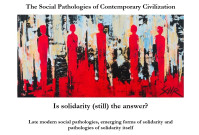
The Social Pathologies of Contemporary Civilization
Call for Papers for the conference to be held on 11/12 June 2020 (Budapest, ELTE TÁTK)
Is Solidarity (still) the answer?
The ninth international conference on The Social Pathologies of Contemporary Civilizations again explores the nature of contemporary malaises, diseases, illnesses and syndromes in their relation to cultural pathologies of the social. This time, however we are focusing explicitly on counter developments to these pathologies and their ambivalences.
Solidarity refers to the elementary bond, essential for maintaining any sort of sociability: everyone is dependent on others in the sense of being potentially reliant on their material or symbolic assistance, while reciprocally they are expected to make efforts and sacrifices for the others. In this sense solidarity is not only a key to handling social pathologies, but also a central dimension of integration: by providing support for (social) suffering, it creates the fundamental sense of belonging, while determining the normative frames of providing help and being in need.
Despite its indispensability, social scientific reflections on modernity viewed solidarity as being more and more in peril. While authors like Durkheim, and Mauss, or Parsons attempted to reconstruct its modern, functionally differentiated version, others like Marx or the first generation of Frankfurt School viewed capitalism as a structure replacing solidarity with irreconcilable conflicts. More recent reflections like Habermas’ theory of colonization, Beck’s concept of global economic and environmental risk society or Castells’ diagnoses of global informational capitalism tend to this latter direction, as they describe new paradoxes or obstacles in the way of emerging solidarity.
Under the auspices of global neoliberalism, the contemporary scene is characterized by the repudiation of ‘Society’ in favour of ‘the Market’ and society is eclipsed by hyper-individuation and homo oeconomicus, the ideal-type rational choice subject of the neoliberal revolution. This has generated new social pathologies, of narcissism, loneliness & isolation, and the proliferation of superficial ‘friends’ on digitally mediatized ‘social networks’ that generate pathological forms of superficiality and mimetic envy, and negative solidarities of hatred and scapegoating.
As a result of these transformations we think that once again fundamental questions concerning solidarity need to be raised from the perspective of its capability of maintaining integration by providing solutions to social suffering.
Is solidarity still the key to late modern crises? If the answer is positive, then what are those forms (beyond "mechanical/ organic" or "class/ status group" solidarities), which are capable of - not integrating, but at least - enabling the collective action of locally and globally fragmented/ divided societies?
What forms of social suffering are targeted by solidarity (e.g. economic, private, political, identity, mental or other illnesses?). Who are entitled as the actors of solidarity (e.g. the state, the civil society, private or public networks?) and what procedures are considered to be the adequate means of expressing solidarity (e.g. expert therapies, political movements?). What are those pathologies which are beyond the range of solidarity (e.g. can global crises, dysfunctions (e.g. climate breakdown) be handled within its framework?) and what are the pathologies of solidarity itself?
The difficult relation of solidarity and therapy: are they complementing each other (having different functionality), are they in conflict (i.e. therapeutic discourses undermine solidarity), or could they learn and benefit from each other (i.e. solidarity through therapeutic practice, or therapy through solidarity)?
And last, but perhaps first: what about the concept of solidarity itself? Does it still stand? What kind of critiques has the concept encountered through the years? Why is it so omnipresent today, what does the over-discussion of solidarity tell us about the late modern condition? Are we in need of another concept to resist the ultra-liberal temptation? Are we facing so many pathologies of solidarity today, that we should conclude that solidarity cannot be the answer to the crises of our times?
As previously, we welcome contributions from various disciplines attempting to answer these questions.
Keynote speakers: Beverley Skeggs (Lancaster University), Céline Cantat (Central European University), Máté Zombory (Hungarian Academy of Sciences), Arpad Szakolczai (University College Cork)

